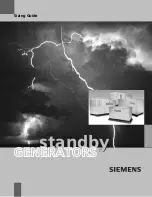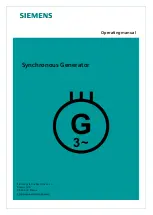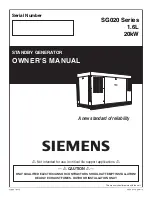
Page 5
60707-110
DYNA SERIES 5/97
BASIC OPERATION
The open circuit charging voltage as measured with DC
meter or a volt-ohm meter will read approximately seven
volts. The peak voltage will be over 16 volts in order to
charge the battery . When the charger is connected to a 12
volt battery the battery voltage will immediately increase
about 0.5 volts, showing that the battery is being charged. A
DC ammeter in series with the charger output will indicate a
current reading approximately equal to the DC nameplate
rating if the battery is discharged.
LOW OIL LEVEL SHUTDOWN SYSTEM
Briggs & Stratton powered generators - Some engine
generator sets come equipped standard with the Briggs &
Stratton OILGARD warning system.
This low oil warning system will automatically stop the
engine before the oil level reaches an operational danger
point. This feature is designed to prevent costly repairs and
downtime.
The OILGARD system uses a float in the engine crankcase
to sense the oil level. If a low oil level condition should occur
during operation, the float will ground out the magneto
impulse, “killing” the engine. In addition, there is an
indicator light mounted on the engine shroud near the recoil
starter. This light will blink on and off to indicate a low oil
level condition when you are attempting to start the unit. To
get the engine started, you must add the required amount of
oil to the engine crankcase.
Use of the OILGARD system on applications that are subject
to shock, bumping or severe angles of operation (in excess
of 15 degrees) should be avoided. This is especially true if
an unexpected shutdown would cause a safety hazard or
serious inconvenience for the operator.
Honda powered generators - These engine generator sets
come equipped standard with the Honda Oil Alert System.
The Oil Alert system is designed to prevent damage caused
by an insufficient amount of oil in the crankcase. Before the
oil level in the crankcase can fall below a safe limit, the Oil
Alert system will automatically shut down the engine (the
engine switch will remain in the ON position).
If the Oil Alert system shuts down the engine, the Oil Alert
lamp will flash when you attempt to start the engine and it
will not run. If this occurs, check the engine oil level.
LP/NG FUEL INSTALLATION
The information in this instruction is offered to assist you in
providing the proper vapor fuel supply for your engine. This
information is only provided to advise you of the engine’s
requirements and the decisions you must make. In no case
should this information be interpreted to conflict with any
local, state or national code. If in doubt, always follow local
codes.
DANGER: FIRE - PERSONAL INJURY -
All fuel lines must be installed by qualified fuel
supplier.
OPERATING LOCATION
The engine-generator models covered in this manual were
designed for portable use. DO NOT INSTALL OR OPERATE
THESE UNITS INDOORS. The unit should be stored in a dry
location. During a power outage move the unit outdoors to a
flat dry location such as a driveway, concrete pad or
sidewalk for use. We recommend installing the optional
dolly kit or equivalent for ease of handling.
The fuel source should be as close as possible to the
outdoor operating location. This will reduce the installation
cost of fuel runs. Connect the fuel supply line to the inlet of
the fuel demand regulator on the unit using a locally
approved flexible fuel line (see table for recommended line
size). The pressure supplied to the demand regulator
must be FOUR TO SIX OUNCES or 7 to 11 INCHES W.C.
(water column). The primary regulator at the fuel supply
must be capable of delivering the proper volume of fuel at
this pressure.
Have your local fuel supplier install a protected fuel
connection at the outside operating location. He should
also install a lockable fuel shutoff valve at the connection
point. Have your fuel supplier permanently install a flexible
fuel line to the demand regulator on the engine generator
set.
INSTALLING THE FUEL LINE
DANGER: PERSONAL INJURY
Units that are intended to be run unattended MUST have
an electric fuel solenoid installed. This solenoid MUST
be wired to AUTOMATICALLY turn off the fuel whenever
the engine stops. See page 12 for additional
information.
Unit location will determine the size of fuel line that is
required to supply the engine with a constant fuel pressure.
Refer to the tables below for fuel line size, and
recommended tank size. For distances of 100 feet and over,
a two regulator fuel system consisting of a primary 10-15#
regulator at the tank and a 6 ounce secondary regulator
installed about 10 feet from the generator. You need to run a
3/4 inch line or larger from the secondary regulator to the
engine-generator set. When a two (2) stage regulator
system is used, a fuel line size of 3/8 inch is generally
adequate for distances up to 300 feet. The line size from the
table below applies to the distance from the second
regulator to the demand regulator. A positive fuel shut-off
device must be installed in the fuel line close to the engine
generator set. This may be either a lockable manual shut-
off valve available from your local fuel installer, or a 12 volt
DC fuel solenoid valve. This optional 12 volt DC valve is
available through your local Winco dealer as part number
42942-000.
The fuel line used to connect the supply line to the demand
regulator must be a locally approved flexible fuel line.
Products used will vary in different regions depending on
availability and local codes. Consult with your local fuel
supplier to insure complete compliance with ALL codes.
1. Remove the pipe plug from the demand
regulator.
2. Connect the flex fuel line to the demand
regulator.






























